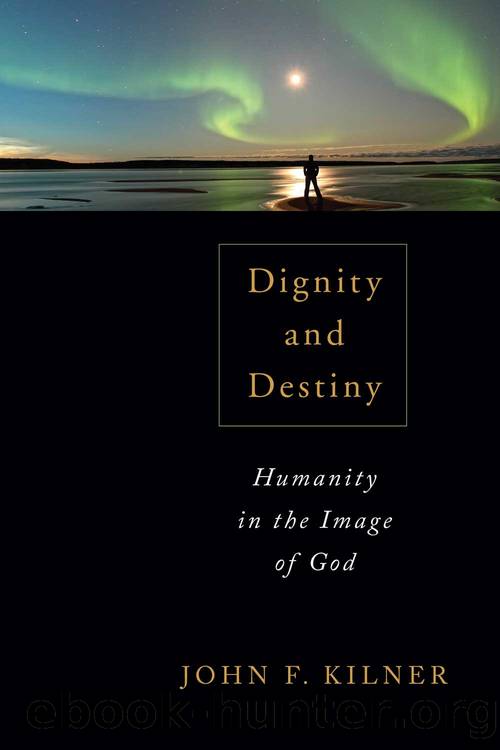Dignity and Destiny by John F. Kilner

Author:John F. Kilner
Language: eng
Format: epub
Publisher: Wm. B. Eerdmans Publishing Co.
Published: 2014-11-19T14:35:07+00:00
A Better Understanding of Human Attributes
If actual human attributes such as reason, righteousness, rulership, and relationship are not what constitute being in Godâs image, what is a better way to understand such attributes and their association with Godâs image? As explained in Chapter 3, an approach more in line with biblical teaching is to recognize that being in Godâs image is about humanityâs special connection with God, which God intends to result in peopleâs reflection of God in many ways. Those intended likenesses include reason, righteousness, rulership, relationship, and many other human attributes that are praiseworthy. But creation in Godâs image has to do with Godâs intention for who people should be. In contrast, human attributes as we now experience them are not what constitutes being in Godâs image â nor are they perversions of what creation in Godâs image once was.
Humanity in Godâs image is about connection and reflection â a special connection with God intended to reflect attributes of God, to Godâs glory and for the flourishing of people as God has always meant them to be. In other words, such attributes are intended consequences of being in Godâs image.243 They are among the purposes for which God has created humanity. There are so many such attributes, and they vary considerably (at least in degree) from person to person. Accordingly, it is not surprising that the biblical texts referring to Godâs image do not attempt to describe all of them. In fact, as many commentators have noted, the biblical passages on Godâs image do not say all that much about what Godâs image entails.244 Instead the rest of the Bible is left to explain and illustrate what God intends people to be and do.
Consider first, then, the place of reason in Godâs purposes. By creating humanity in Godâs image, God has created an unbreakable connection with humanity, with the intention that humanity would live with rational and spiritual attributes that in some small but wonderful measure reflect Godâs own. Reason, then, is one of the human attributes that ought to flow from being in the image of God â it is not, in itself, what constitutes being in Godâs image.245 It is a particularly strategic capacity since it is a prerequisite for other human attributes that flow from being in Godâs image, such as rulership246 and relationship.247 Because of sin, reason has not developed in people as God intended. That does not mean people are devoid of reason. Rather, it indicates that peopleâs reason is distorted until Christ breaks the power of sin to allow reason to develop and function as God intends.
Having righteousness is similarly not the definition of what it means to be in Godâs image; rather, righteousness ought to flow from being in Godâs image.248 That is Godâs intention. Righteousness is also an attribute foundational to other attributes that God intends to characterize human beings. For reason or rulership to operate properly, for instance, righteousness must accompany them.249 While there was a âvery goodnessâ to all of creation in the beginning (Gen.
Download
This site does not store any files on its server. We only index and link to content provided by other sites. Please contact the content providers to delete copyright contents if any and email us, we'll remove relevant links or contents immediately.
The Secret Power of Speaking God's Word by Joyce Meyer(3159)
Signature in the Cell: DNA and the Evidence for Intelligent Design by Stephen C. Meyer(3123)
Real Sex by Lauren F. Winner(3005)
The Holy Spirit by Billy Graham(2938)
The Gnostic Gospels by Pagels Elaine(2517)
Jesus by Paul Johnson(2349)
Devil, The by Almond Philip C(2323)
23:27 by H. L. Roberts(2245)
The Nativity by Geza Vermes(2224)
Chosen by God by R. C. Sproul(2158)
All Things New by John Eldredge(2151)
Angels of God: The Bible, the Church and the Heavenly Hosts by Mike Aquilina(1951)
The Return of the Gods by Erich von Daniken(1925)
Angels by Billy Graham(1917)
Knowing God by J.I. Packer(1848)
Jesus of Nazareth by Joseph Ratzinger(1802)
The Gnostic Gospel of St. Thomas by Tau Malachi(1781)
How To Be Born Again by Billy Graham(1775)
Evidence of the Afterlife by Jeffrey Long(1773)
